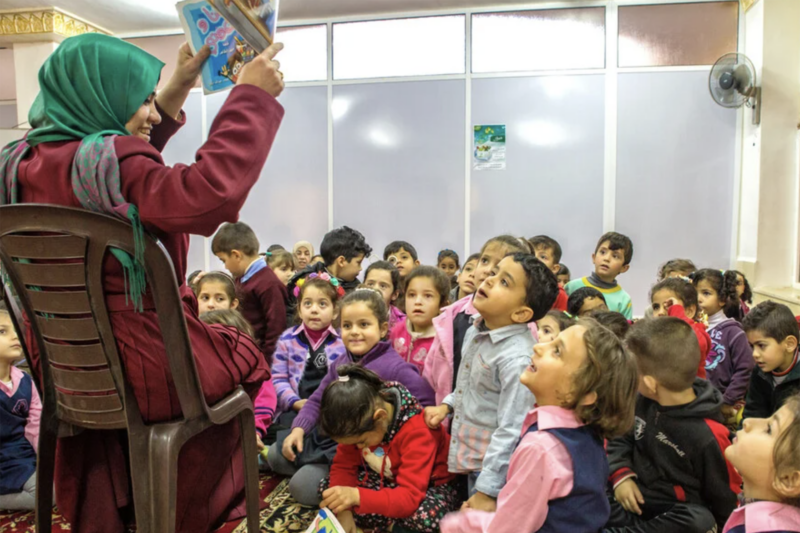In the global South, volunteer programs are framed by policymakers and scholars as an effective vehicle for empowering women living in poverty. But this narrative often rests on scant knowledge of the perspectives and experiences of a key set of local stakeholders: the volunteers.
A new study co-authored by Yale anthropologist Catherine Panter-Brick addresses this knowledge gap by engaging with Syrian refugee and Jordanian women from poor households in Amman, Jordan, and mapping their conceptions of empowerment and life satisfaction along with their perceptions of the benefits they acquire from volunteering.
Incorporating these local perspectives and experiences informs policymaking and reduces cultural and scientific bias, Panter-Brick said.
“Assuming that concepts embraced by scientists and policymakers are exactly the same as those held by refugees or the urban poor is problematic and leads to ineffective policies,” said Panter-Brick, the Bruce A. and Davi-Ellen Chabner Professor of Anthropology, Health, and Global Affairs at the Jackson School and the study’s lead author. “Efforts to understand how local people reason and what they perceive drives change in their communities are critical to doing research and evaluations of policy interventions in ways that ring true to local stakeholders.”
For the study, published on May 30 in the journal Frontiers in Sociology, Panter-Brick and her co-authors employed an approach known as fuzzy cognitive mapping (FCM) — which combines a visual representation of people’s knowledge with measurements of their “fuzzy” logic of causality — to capture local understandings of empowerment and life satisfaction. The researchers mapped the effects of We Love Reading, an award-winning program active in 65 countries that trains volunteers to read aloud to children, encouraging them to become changemakers in their communities.
The methodology allows researchers to graphically represent a network of factors showing how participants think about causal relationships and systems change. It visually captures the complexity and ambiguity inherent to many connections in the ‘mental maps’ participants generate. Factors can be tangible and measurable — like education or money — or abstract and less easily quantified, such as social constructs like empowerment, the researchers explained.
They conducted four FCM sessions with 20 Syrian and 17 Jordanian women, with varied levels of education, all from low-income households. The sessions featured two steps.
First, the women defined empowerment and life satisfaction from their perspectives. They generally defined “empowerment” as having the self-confidence, ability, and strength to act independently, according to the study. They also identified multiple dimensions of empowerment, including financial, cultural, personal, and social.
Participants viewed life satisfaction as feeling “contentment” about what one has and having the “ability” to adapt to cope with challenges. On a psychological level, they noted the importance of finding “peace of mind” and of “patience and resilience,” as well as experiencing feelings of happiness and fulfillment. On a spiritual level, they highlighted the need for “acceptance” of life’s reality.
Second, the women mapped the connections between factors, such as negative or positive associations between education, mental health, and family support, and outcomes such as empowerment and life satisfaction. They then assigned relative weights to those connections, from -1 to +1.
The most frequently mentioned variables influencing the women’s perceptions of empowerment and life satisfaction included family support, money, work, and having a controlling husband, the researchers found.
To better understand the relative importance of these specific variables to systemic thinking, the researchers ran a series of “what if” scenarios using “Mental Modeler,” an online modeling software that helps capture and analyze people’s knowledge about complex social problems. They focused on potential change scenarios triggered by four factors — paid work, education, money, and volunteering — that are amenable to change through public policy and generally considered important to human dignity and quality of life.
The researchers found that increasing paid work, education, and money all increased women’s levels of empowerment in life satisfaction. For example, when women have money, providing them relatively more financial independence, it reduces the negative influence of a controlling husband, according to the study.
By manipulating variables associated with volunteering programs, the researchers learned that volunteering created more opportunities for women to play a role in society and enhanced their psychological empowerment. Specifically, they found that participating in the We Love Reading program contributed to the women’s cultural empowerment, defined in terms of having opportunities to educate oneself and to become productive in the community.
“Gaining a more locally accurate understanding of the nature and impact of volunteering programs has important, practical applications for science diplomacy and public policy,” said Panter-Brick, who also directs the Global Health Studies Program at Jackson. “Our study gives a sense of how to design culturally relevant, locally grounded, community-based programs, as well as how to evaluate them in a locally informed manner.”
The study builds on prior research, co-led by Panter-Brick, which provided evidence that participating in We Love Reading enhanced women’s sense of life satisfaction and that volunteering helps women to diversify their social networks, boosting empowerment through opportunities to learn and socially interact.
The study was co-authored by Lina Qtaishat of the Yale Program on Conflict, Resilience and Health, and the Taghyeer organization in Amman, Jordan; Jannik J. Eggerman of the Yale Program on Conflict, Resilience and Health; Honey Thomas MPP ’24 of the Yale Jackson School of Global Affairs and the Yale Program on Conflict, Resilience and Health; Praveen Kumar of Boston College; and Rana Dajani of the Hashemite University in Zarqa, Jordan.
